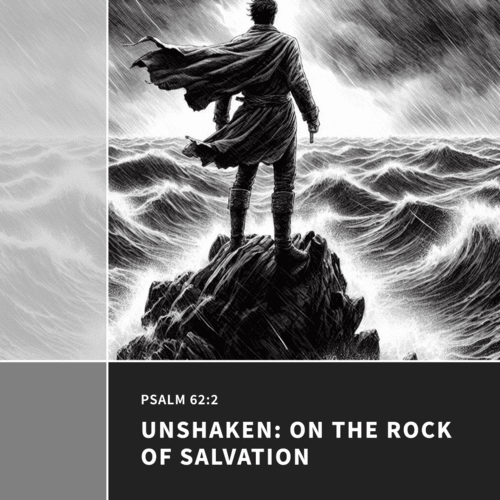What Does ‘Born of Water’ in John 3:5 Mean?
THE REFORMED VIEW VS OTHER INTERPRETATIONS
”Jesus answered, ‘Truly, truly, I say to you, unless one is born of water and the Spirit, he cannot enter the kingdom of God.’”—John 3:5
Few verses in Scripture have sparked as much theological debate as John 3:5. What did Jesus mean when He told Nicodemus one must be “born of water and the Spirit”? The answer has profound implications for how we understand salvation, baptism, and the gospel itself.
THE CONTEXT: A CONFUSED TEACHER
Picture the scene: Nicodemus, a respected Pharisee and teacher in Israel, comes to Jesus under cover of darkness. He’s intrigued by Jesus’ miracles but puzzled by His teaching about being “born again.” When Nicodemus asks how someone can be born when they’re old, Jesus responds with the famous words of John 3:5.
This isn’t a random theological discourse. Jesus is addressing a specific confusion from a man who should have understood these concepts. The key lies in recognising what Jesus expected Nicodemus to already know.
THE OLD TESTAMENT FOUNDATION
When Jesus rebukes Nicodemus—“Are you the teacher of Israel and yet you do not understand these things?”—He’s pointing to something a Jewish teacher should have grasped from the Hebrew Scriptures. The answer is found in Ezekiel 36:25-27.
This prophetic promise describes God’s work of spiritual renewal using two complementary images: cleansing water and the indwelling Spirit. Jesus isn’t introducing a new concept—He’s announcing the fulfillment of this ancient promise.
THE REFORMED UNDERSTANDING: ONE BIRTH, TWO DESCRIPTIONS
Here’s the Reformed interpretation: “born of water and the Spirit” describes a single supernatural birth from two angles. The “water” represents the cleansing aspect of regeneration—the washing away of sin’s guilt and pollution. The “Spirit” represents the life-giving aspect—the imparting of new spiritual life.
This isn’t two separate births or two separate requirements. It’s one glorious work of God described with rich, complementary imagery. Just as we might say, “I was overwhelmed with joy and happiness,” we’re using two terms to describe one emotional experience more fully.
Consider how this fits the immediate context. In verse 6, Jesus clarifies: “That which is born of the flesh is flesh, and that which is born of the Spirit is spirit.” He’s not contrasting baptism with the Spirit, but flesh with Spirit—the natural with the supernatural.
WHY OTHER INTERPRETATIONS FALL SHORT
The Baptismal Regeneration View: Many traditions interpret “water” as referring to baptism, making the sacrament necessary for salvation. This view faces several serious problems:
- It contradicts salvation by grace alone. If baptism is required for salvation, then salvation depends partly on a human work—getting baptised. This undermines the clear biblical teaching that we’re saved by grace through faith alone (Ephesians 2:8-9).
- It creates biblical inconsistencies. John’s Gospel repeatedly presents faith as the sole requirement for salvation (John 1:12, 3:16, 5:24, 6:47). If baptism were necessary, wouldn’t John mention it in these crucial passages?
- It raises troubling questions. What about the thief on the cross, who was promised paradise without baptism? What about those who believe but die before baptism? The baptismal regeneration view creates pastoral nightmares.
The Physical Birth View: Some suggest “water” refers to amniotic fluid, making the verse about physical birth followed by spiritual birth. This interpretation fails because:
- It makes Jesus’s statement meaningless. Everyone is born physically—why would Jesus state the obvious to address Nicodemus’s confusion about spiritual transformation?
- It misses the prophetic background. This view ignores the clear connection to Ezekiel 36 and other Old Testament cleansing passages.
- It creates an awkward parallel. If “water” refers to physical birth, the parallel with “Spirit” becomes forced and unnatural.
The View That It Refers to John the Baptist’s Baptism: Others suggest “water” refers specifically to John the Baptist’s baptism. But this creates a temporal limitation that doesn’t fit the universal scope of Jesus’ statement. More fundamentally, John’s baptism was preparatory, not regenerative—it pointed forward to Christ’s work rather than accomplishing salvation.
THE THEOLOGICAL COHERENCE OF THE REFORMED VIEW
The Reformed interpretation maintains beautiful theological consistency:
- It preserves the unity of salvation. Regeneration is entirely God’s work, not a cooperative effort between divine grace and human sacraments. The same Spirit who cleanses also gives life.
- It maintains proper causation. Faith is the result of regeneration, not its cause. God must first cleanse our hearts and give us new life before we can truly believe.
- It clarifies the role of baptism. Baptism becomes a precious sign and seal of what God has already accomplished, not a requirement for salvation. This gives the sacrament its proper dignity without making it a condition for grace.
ADDRESSING COMMON OBJECTIONS
“But the early church fathers taught baptismal regeneration.” Early church development doesn’t determine apostolic truth. Scripture must judge tradition, not the reverse. Moreover, the fathers weren’t unanimous on this issue, and some clearly distinguished between the sign and the thing signified.
“If both water and Spirit are mentioned, both must be literal.” John’s Gospel regularly uses physical imagery for spiritual realities. Jesus speaks of living water (John 4:10), rivers of living water (John 7:38), and eating His flesh (John 6:53). The Gospel’s theology is deeply metaphorical, using earthly images to convey heavenly truths.
“Why mention water at all if it’s not baptism?” The water imagery is essential for understanding regeneration. Without the concept of cleansing, we’d miss a crucial aspect of what God does in salvation. The Old Testament background makes this language not optional but necessary.
WHAT THIS MEANS FOR US
Understanding John 3:5 correctly has profound practical implications:
- For our assurance: Our confidence rests on God’s promise and work, not on whether we’ve been baptized correctly or at all. If you’ve trusted in Christ, you can be certain of your salvation.
- For evangelism: We can present the gospel clearly—salvation is by faith alone in Christ alone. We don’t need to worry about sacramental prerequisites or create unnecessary barriers to belief.
- For baptism: We can celebrate baptism as a beautiful picture of what God has done without making it a requirement for salvation. This actually elevates the sacrament by freeing it from the burden of earning grace.
WHAT DOES ‘BORN OF WATER’ MEAN? THE HEART OF THE MATTER
At its core, this debate is about the nature of the gospel itself. The Reformed interpretation preserves the biblical truth that salvation is entirely God’s work from beginning to end. When Jesus told Nicodemus about being born of water and the Spirit, He was describing the supernatural, sovereign work of God in creating new life.
This isn’t about diminishing the importance of baptism or the church’s sacraments. It’s about maintaining the clarity of the gospel and the freeness of grace. When we understand that both the cleansing and the life-giving work of salvation are God’s doing, we can rest fully in His finished work.
The “water” in John 3:5 represents the cleansing work of God’s Spirit in regeneration—the washing away of sin’s guilt and defilement as part of the glorious work of the new birth. This interpretation honours the text, maintains theological consistency, and preserves the gospel of grace that has transformed countless lives throughout history.
As Jesus told Nicodemus, and as He tells us today: this new birth is not something we accomplish but something we receive. It’s not about what we do, but about what God does. And what God does, He does completely, effectually, and graciously—cleansing us and giving us new life by His Spirit alone.
WHAT DOES ‘BORN OF WATER’ MEAN? RELATED FAQs
What was John Calvin’s specific view on the “water” in John 3:5? Calvin believed “water” and “Spirit” refer to the same regenerating work, just as “Spirit and fire” in Matthew 3:11 describe one work with two complementary images. He taught: “By the word Water is denoted the renunciation of the old man, while by the Spirit believers understand the new life,” but ultimately saw these as two aspects of the same divine transformation. Calvin explicitly rejected making water refer to literal baptism as a requirement for salvation, maintaining the metaphor describes the cleansing aspect of regeneration itself.
- How did Charles Spurgeon interpret John 3:5 in his preaching? Spurgeon consistently emphasised the new birth described in John 3:5 is entirely God’s sovereign work, not dependent on human sacraments. He preached the change is “radical” and “gives us new natures,” making us “love what we hated and hate what we loved.” While Spurgeon valued baptism highly, he never made it a requirement for salvation, instead focusing on the transformative power of the Spirit’s regenerating work. His approach aligned with the Reformed understanding that regeneration precedes and enables faith.
- What was RC Sproul’s position on the relationship between John 3:5 and baptismal regeneration? Sproul strongly opposed baptismal regeneration. He argued making baptism necessary for salvation violates the principle of sola fide (faith alone). He taught John 3:5 describes the work of the Holy Spirit in regeneration, with “water” representing the cleansing aspect of this spiritual transformation. Sproul emphasised justification is by faith alone, and any view that makes sacraments co-instrumental in salvation undermines the gospel of grace. He maintained baptism follows regeneration as a sign and seal, not as a cause of salvation.
How does John MacArthur handle the “water and Spirit” phrase in John 3:5? MacArthur interprets “born of water and the Spirit” as describing one birth with two aspects: cleansing and life-giving. He argues the “water” refers to the cleansing, purifying work of the Word of God and the Spirit in regeneration, often connecting it to Ephesians 5:26 where the church is cleansed “with the washing of water by the word.” MacArthur firmly rejects baptismal regeneration, teaching salvation is by grace alone through faith alone. He emphasises the new birth is entirely God’s sovereign work, not dependent on human cooperation or sacramental participation.
- Did the early church unanimously teach baptismal regeneration based on John 3:5? No, the early church was not unanimous on this interpretation. While some church fathers did connect John 3:5 to baptismal necessity, others understood it metaphorically or focused on the spiritual transformation rather than the sacramental act. Even among those who emphasised baptism, there were significant differences in understanding the relationship between the sacrament and salvation. The development of sacramental theology was gradual and varied, with some regions and theologians maintaining more evangelical perspectives on the primacy of faith over ritual.
- How does the Greek grammar of John 3:5 support or challenge each interpretation of the verse? The Greek phrase ex hydatos kai pneumatos uses a single preposition (ek/ex) governing both “water” and “Spirit,” suggesting they describe aspects of one reality rather than two separate requirements. The conjunction (kai) can be explanatory rather than additive, supporting the Reformed view that these terms complement each other. Additionally, the parallel structure with verse 6’s “flesh” and “spirit” distinction reinforces Jesus is contrasting natural versus supernatural birth, not baptism versus spiritual transformation.
What role does the concept of “living water” elsewhere in John’s Gospel play in interpreting John 3:5? John’s consistent use of “living water” as a metaphor for spiritual realities (John 4:10-14, 7:37-39) strongly supports understanding “water” in John 3:5 metaphorically rather than sacramentally. In John 4, Jesus offers “living water” that becomes “a spring of water welling up to eternal life,” clearly referring to spiritual transformation rather than baptism. This pattern in John’s Gospel demonstrates “water” language typically points to the cleansing, life-giving work of the Spirit rather than to literal water baptism. The consistency of this metaphorical usage throughout John’s Gospel reinforces the Reformed interpretation of John 3:5.
WHAT DOES ‘BORN OF WATER’ MEAN? OUR RELATED POSTS
- Living Waters and Jesus: What’s The Connection?
- Can Baptism Forgive Sins? What Does Acts 2:38 Mean?
- Regeneration Or Faith? Which Comes First in Salvation?
- The Ordo Salutis: What are the Seven Steps in Our Salvation?
- Salvation: By Faith Or Works? Or Both?
Editor's Pick

Paul’s Mandate for Men: Headship Or Servant Leadership? Or Both?
Modern Christianity has fallen into a trap. We've created an either/or battle between "headship" and "servant leadership," as if these [...]

Should We Stop Using Male Pronouns for God? Why Do We Say No?
A friend of ours arrived eagerly at his first theology class in seminary. But he quickly discovered something troubling: the [...]

Did Old Testament Law Force Women to Marry their Rapists?
**Editor’s Note: This post is part of our series, ‘Satan’s Lies: Common Deceptions in the Church Today’… Viral misinformation abounds [...]

From Danvers To Nashville: Two Statements, One Biblical Vision
30 years separate the Danvers Statement on Biblical Manhood and Womanhood (1987) and the Nashville Statement on Human Sexuality (2017). [...]

The Nashville Statement: Why Affirm It Despite Media Backlash?
WHY DO REFORMED CHRISTIANS STAND BY THIS STATEMENT ON MARRIAGE AND GENDER? When the Nashville Statement was released in 2017, [...]

Who Is Belial? Solving The 2 Corinthians 6:15 Mystery
Belial: This name from the pages of Scripture chills the soul. Who is this mysterious figure Paul invokes in 2 [...]

Celibacy Or Castration: What Jesus Really Means in Matthew 19:12
One of Scripture's most shocking misinterpretations led theologian Origen to castrate himself in the third century. His tragic mistake? Taking [...]

Philippians 4:13: Did Paul Really Mean We Can Do ALL Things?
"I can do all things through Christ who strengthens me." It's on gym walls, graduation cards, and motivational posters everywhere. [...]

The Ordinary Means of Grace: Why Are They Indispensable?
ORDINARY MEANS FOR EXTRAORDINARY TRANSFORMATION What if God's most powerful work in believers' lives happens through the most ordinary activities? [...]

Is the Bible God’s Word? Or Does It Only Contain God’s Word?
The authority of Scripture stands at the crossroads of modern Christianity. While some argue the Bible merely contains God’s Word [...]
SUPPORT US:
Feel the Holy Spirit's gentle nudge to partner with us?
Donate Online:
Account Name: TRUTHS TO DIE FOR FOUNDATION
Account Number: 10243565459
Bank IFSC: IDFB0043391
Bank Name: IDFC FIRST BANK






